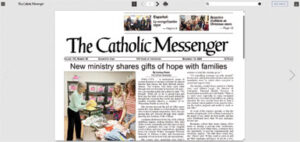
Pontius Pilate, Herod, Philip, Lysanias and then Annas and Caiaphas. Men of history that most of us don’t hear much about except in this week’s Gospel reading and some in the recounting of Christ’s Passion.
I’d wager most people don’t even know what a tetrarch is. At the time of the writing of Luke’s Gospel, it was important to include these details as they made contextual sense to the original audience. To us today, they are just passing details before getting to the heart of the story: John the Baptist as the voice crying out in the desert, fulfilling the prophecy of Isaiah. These are names we know!
I read all of this and can’t help but think about our own country’s politics, how we get so caught up and divided and scared and — in the worst case — hateful. It’s quite disheartening to see how easily so many Christians across the political spectrum forget ultimately who we are and to whom we belong in an election year.
As serious as the politics of a given time are, this Gospel speaks to me about how they are also fleeting in the face of God’s everlasting message and plan. To lose sight of that in the whirlwind of a political climate can be detrimental. The political climate changes and passes away.
That is sort of what John is talking about, isn’t it? He’s fulfilling a prophecy that came some 700 years before he was born! Seven-hundred years before I was born was the year 1301, our country wouldn’t exist for another 475 years. Yet, people were proclaiming the Word of God as they were in John’s time 1,270 years earlier and in Isaiah’s time centuries before that, and as they are now.
It is a call relevant to every believer through the ages, “Prepare the way of the Lord, make straight his paths.” What is “the way of the Lord”? It is through the human heart. That is the path we’re called to prepare, to make straight, to untangle. In this world, it is so easy to get twisted around, to believe that things are as bad as they could be, to despair looking into the darkness, or to feel lost in a desert, disagreeing and disconnecting from those around us. That is precisely where God’s word comes to us as it did to John.
You don’t have to be the cousin of Jesus to continue this message of salvation. God pours his grace and mercy out on the world through the love and work and prayers of each of us and for all of us.
“Every valley shall be filled and every mountain and hill shall be made low.” All shall be level; all shall be equal. As we come out of yet another election season and into another season of Advent, God is inviting us to rest in his great constancy. The shifting tides of the world should not disturb us.
We are to come to God with our minds troubled by sin and evil, to repent, and to allow him to smooth the ways of our hearts so that his love and his message can travel to us, through us, and to others.
I would like to leave you with these words of St. Teresa of Avila as a reminder to prepare ourselves in imitation of Christ for the blessings that God has for this world in this time, just as he did 2,000 years ago:
“Christ has no body but yours,
No hands, no feet on earth but yours,
Yours are the eyes with which he looks
Compassion on this world,
Yours are the feet with which he walks to do good,
Yours are the hands, with which he blesses all the world.”
(Valerie Teets belongs to St. Mary of the Visitation Parish in Iowa City.)










